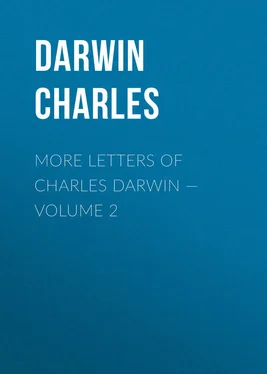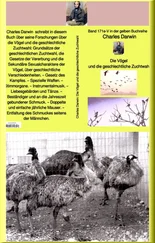Charles Darwin - More Letters of Charles Darwin — Volume 2
Здесь есть возможность читать онлайн «Charles Darwin - More Letters of Charles Darwin — Volume 2» — ознакомительный отрывок электронной книги совершенно бесплатно, а после прочтения отрывка купить полную версию. В некоторых случаях можно слушать аудио, скачать через торрент в формате fb2 и присутствует краткое содержание. Жанр: foreign_antique, foreign_prose, на английском языке. Описание произведения, (предисловие) а так же отзывы посетителей доступны на портале библиотеки ЛибКат.
- Название:More Letters of Charles Darwin — Volume 2
- Автор:
- Жанр:
- Год:неизвестен
- ISBN:нет данных
- Рейтинг книги:5 / 5. Голосов: 1
-
Избранное:Добавить в избранное
- Отзывы:
-
Ваша оценка:
- 100
- 1
- 2
- 3
- 4
- 5
More Letters of Charles Darwin — Volume 2: краткое содержание, описание и аннотация
Предлагаем к чтению аннотацию, описание, краткое содержание или предисловие (зависит от того, что написал сам автор книги «More Letters of Charles Darwin — Volume 2»). Если вы не нашли необходимую информацию о книге — напишите в комментариях, мы постараемся отыскать её.
More Letters of Charles Darwin — Volume 2 — читать онлайн ознакомительный отрывок
Ниже представлен текст книги, разбитый по страницам. Система сохранения места последней прочитанной страницы, позволяет с удобством читать онлайн бесплатно книгу «More Letters of Charles Darwin — Volume 2», без необходимости каждый раз заново искать на чём Вы остановились. Поставьте закладку, и сможете в любой момент перейти на страницу, на которой закончили чтение.
Интервал:
Закладка:
LETTER 447. TO J. JENNER WEIR. Down, June 18th {1868}.
Many thanks. I am glad that you mentioned the linnet, for I had much difficulty in persuading myself that the crimson breast could be due to change in the old feathers, as the books say. I am glad to hear of the retribution of the wicked old she-bullfinch. You remember telling me how many Weirs and Jenners have been naturalists; now this morning I have been putting together all my references about one bird of a pair being killed, and a new mate being soon found; you, Jenner Weir, have given me some most striking cases with starlings; Dr. Jenner gives the most curious case of all in "Philosophical Transactions" (447/1. "Phil. Trans." 1824.), and a Mr. Weir gives the next most striking in Macgillivray. (447/2. Macgillivray's "History of British Birds," Volume I., page 570. See "Descent of Man" (1901), page 621.) Now, is this not odd? Pray remember how very glad we shall be to see you here whenever you can come.
Did some ancient progenitor of the Weirs and Jenners puzzle his brains about the mating of birds, and has the question become indelibly fixed in all your minds?
LETTER 448. TO A.R. WALLACE. August 19th {1868}.
I had become, before my nine weeks' horrid interruption of all work, extremely interested in sexual selection, and was making fair progress. In truth it has vexed me much to find that the farther I get on the more I differ from you about the females being dull-coloured for protection. I can now hardly express myself as strongly, even, as in the "Origin." This has much decreased the pleasure of my work. In the course of September, if I can get at all stronger, I hope to get Mr. J. Jenner Weir (who has been wonderfully kind in giving me information) to pay me a visit, and I will then write for the chance of your being able to come, and I hope bring with you Mrs. Wallace. If I could get several of you together it would be less dull for you, for of late I have found it impossible to talk with any human being for more than half an hour, except on extraordinary good days.
(448/1. On September 16th Darwin wrote to Wallace on the same subject: — )
You will be pleased to hear that I am undergoing severe distress about protection and sexual selection; this morning I oscillated with joy towards you; this evening I have swung back to the old position, out of which I fear I shall never get.
LETTER 449. TO A.R. WALLACE.
(449/1. From "Life and Letters," Volume III., page 123.)
Down, September 23rd {1868}.
I am very much obliged for all your trouble in writing me your long letter, which I will keep by me and ponder over. To answer it would require at least 200 folio pages! If you could see how often I have rewritten some pages you would know how anxious I am to arrive as near as I can to the truth. I lay great stress on what I know takes place under domestication; I think we start with different fundamental notions on inheritance. I find it is most difficult, but not, I think, impossible to see how, for instance, a few red feathers appearing on the head of a male bird, and which are at first transmitted to both sexes, would come to be transmitted to males alone. It is not enough that females should be produced from the males with red feathers, which should be destitute of red feathers; but these females must have a latent tendency to produce such feathers, otherwise they would cause deterioration in the red head-feathers of their male offspring. Such latent tendency would be shown by their producing the red feathers when old, or diseased in their ovaria. But I have no difficulty in making the whole head red if the few red feathers in the male from the first tended to be sexually transmitted. I am quite willing to admit that the female may have been modified, either at the same time or subsequently, for protection by the accumulation of variations limited in their transmission to the female sex. I owe to your writings the consideration of this latter point. But I cannot yet persuade myself that females alone have often been modified for protection. Should you grudge the trouble briefly to tell me, whether you believe that the plainer head and less bright colours of female chaffinch, the less red on the head and less clean colours of female goldfinch, the much less red on the breast of the female bullfinch, the paler crest of golden-crested wren, etc., have been acquired by them for protection? I cannot think so, any more than I can that the considerable differences between female and male house-sparrow, or much greater brightness of male Parus caeruleus (both of which build under cover) than of female Parus, are related to protection. I even misdoubt much whether the less blackness of female blackbird is for protection.
Again, can you give me reasons for believing that the moderate differences between the female pheasant, the female Gallus bankiva, the female of black grouse, the pea-hen, the female partridge, have all special references to protection under slightly different conditions? I, of course, admit that they are all protected by dull colours, derived, as I think, from some dull-ground progenitor; and I account partly for their difference by partial transference of colour from the male, and by other means too long to specify; but I earnestly wish to see reason to believe that each is specially adapted for concealment to its environment.
I grieve to differ from you, and it actually terrifies me and makes me constantly distrust myself. I fear we shall never quite understand each other. I value the cases of bright-coloured, incubating male fisher, and brilliant female butterflies, solely as showing that one sex may be made brilliant without any necessary transference of beauty to the other sex; for in these cases I cannot suppose that beauty in the other sex was checked by selection.
I fear this letter will trouble you to read it. A very short answer about your belief in regard to the female finches and Gallinaceae would suffice.
LETTER 450. A.R. WALLACE TO CHARLES DARWIN. 9, St. Mark's Crescent, N.W., September 27th, 1868.
Your view seems to be that variations occurring in one sex are transmitted either to that sex exclusively or to both sexes equally, or more rarely partially transferred. But we have every gradation of sexual colours, from total dissimilarity to perfect identity. If this is explained solely by the laws of inheritance, then the colours of one or other sex will be always (in relation to the environment) a matter of chance. I cannot think this. I think selection more powerful than laws of inheritance, of which it makes use, as shown by cases of two, three or four forms of female butterflies, all of which have, I have little doubt, been specialised for protection.
To answer your first question is most difficult, if not impossible, because we have no sufficient evidence in individual cases of slight sexual difference, to determine whether the male alone has acquired his superior brightness by sexual selection, or the female been made duller by need of protection, or whether the two causes have acted. Many of the sexual differences of existing species may be inherited differences from parent forms, which existed under different conditions and had greater or less need of protection.
I think I admitted before, the general tendency (probably) of males to acquire brighter tints. Yet this cannot be universal, for many female birds and quadrupeds have equally bright tints.
To your second question I can reply more decidedly. I do think the females of the Gallinaceae you mention have been modified or been prevented from acquiring the brighter plumage of the male, by need of protection. I know that the Gallus bankiva frequents drier and more open situations than the pea-hen of Java, which is found among grassy and leafy vegetation, corresponding with the colours of the two. So the Argus pheasant, male and female, are, I feel sure, protected by their tints corresponding to the dead leaves of the lofty forest in which they dwell, and the female of the gorgeous fire-back pheasant Lophura viellottii is of a very similar rich brown colour.
Читать дальшеИнтервал:
Закладка:
Похожие книги на «More Letters of Charles Darwin — Volume 2»
Представляем Вашему вниманию похожие книги на «More Letters of Charles Darwin — Volume 2» списком для выбора. Мы отобрали схожую по названию и смыслу литературу в надежде предоставить читателям больше вариантов отыскать новые, интересные, ещё непрочитанные произведения.
Обсуждение, отзывы о книге «More Letters of Charles Darwin — Volume 2» и просто собственные мнения читателей. Оставьте ваши комментарии, напишите, что Вы думаете о произведении, его смысле или главных героях. Укажите что конкретно понравилось, а что нет, и почему Вы так считаете.












